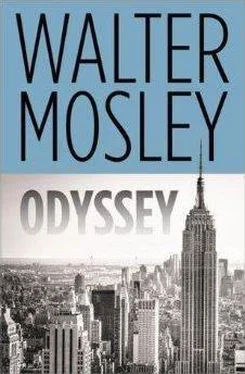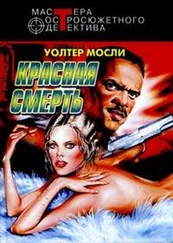“You changed, Sovy,” Drum-Eddie James said. “You sound like you lettin’ the world in.”
“Will you come?”
“Mama said that you haven’t seen her since two weeks after the FBI came lookin’ for me.”
“You come here and we’ll go see her together.”
“Take care a’ yourself, JJ,” Drum said before breaking the connection.
At eleven twenty-seven that morning Sovereign James was at his desk deep into the applications of potential employees. Just one day back and his desk was already piled with work.
He enjoyed leafing through the résumés. For some reason his job seemed easier and clearer than it had ever been before. There was challenging information to decipher but no longer was he scrutinizing the words for secret codes about gender, race, and revolution. The forms were filled with truths and lies, hopes and hapless fatalism.
Hardin Pope had attended high school in Virginia and college in Atlanta. He ended his bout with higher learning at the University of Massachusetts in Amherst. There he started out as a mathematician but changed his course to modular systems design. When Mr. Pope came in for his interview, Sovereign decided, the proper question to ask would be why he changed his major.
He scribbled that note on the form, placed it on the interview pile, and was reaching for another folder when someone knocked on his door. He wondered if Shelly was away from her desk. The young receptionist often was in the toilet or down at the staff kitchen flirting with the men from the mailroom.
“Come in,” he said.
The phone rang.
Darius Maynard opened the door and entered, followed by six other employees: Donna Price from accounting; Lola Alifah, who managed the new accounts in the marketing department; Winston Shatz, the security supervisor; Warren Chisel; LeAnne Moore; and finally Bob Simon, assistant to the vice president in charge of operations. Four of the men and Lola carried plastic red folding chairs.
Sovereign smiled. He had never before seen the seven African-American employees, handpicked by him, gathered together. And even though he now questioned the validity of his actions he still felt a parental kinship.
“Mr. James,” Darius began.
“Shelly?” Sovereign called out.
The phone rang for the third time.
“Shelly?” No answer.
Sovereign held up a hand to Darius. The others were settling in.
“My receptionist stepped away,” James said. “I’ll just take this and then switch it over to the automated system... Hello?”
“Sovereign.”
“Hey, Toni. I’m surprised to hear from you.”
“Lem’s mother called my moms last night. She was cryin’ ovah him,” the young woman said, bulling her way headlong into a speech that she had obviously practiced. “She said that he was dyin’ and that it was because a’ me. So that’s why I went down there. And when I saw him it hurt my heart. I know that he jumped you. I know that you went crazy because he attacked you in your own house. But when you walked in that hospital room and he was lyin’ there I felt so bad that I couldn’t even think about bein’ wit’ you. That’s why I didn’t come ovah...”
“Toni, I—”
“I know I shoulda called you or sumpin’,” she said, cutting him off. “But I was hurtin’ and I didn’t know how to talk. I mean, I was only thirteen when I first started seein’ Lem. It’s like I’ve known him since the first day I was a woman. But I don’t wanna let you go, Sovereign. I don’t want you to change the locks and tell the doormen to send me away. I know I should have called but I couldn’t, but I can’t just stop seein’ you neither...”
“I’m in the middle of a meeting,” Sovereign managed to say. “Come on by tonight and we’ll have dinner and talk about it.”
“You not just sayin’ that?”
“Come over at seven and we’ll go out for a nice French dinner.”
There was the pressure of tears behind his eyes, but Sovereign held them back. The group had settled in their chairs. He wondered what they were doing there and why the child’s words moved him so. These thoughts blended together, strained for unity, but failed.
“Mr. James,” Darius said again.
“I’m all yours, Mr. Maynard.” He hung up the phone and hit the buttons necessary to channel future calls to the answering system.
“We all got together last night after work and talked about what you told me yesterday,” Darius began. “But just to get it right... You said that you held us black job applicants to a higher standard.”
Sovereign took in a deep breath through his nostrils. He gazed around at the various shades of his secret army, wondering if maybe this was a coup or a betrayal. Then he considered the inflated nature of his thoughts. Regardless... events had taken him beyond caring about Techno-Sym and his future, or his past, there.
“Yes,” he said. “That’s right.”
“Why?” Lola Alifah demanded. She was dark skinned, forty, with ringlets for a hairstyle, two children at home, and no husband. She’d gone to Columbia but Sovereign hadn’t held that against her.
“Because I thought that if I hired only the best people of color, one day you guys would take over the company.”
“Isn’t that crazy?” Warren Chisel, the biracial data editor, asked. He was from California and had to go to a junior college before he was prepared for UCLA.
“The world is crazy,” Sovereign said, not looking directly at Warren. “Most people work for the system knowing that the cards are stacked against them. Mostly they don’t do anything about it. I figured I would.”
Bob Simon, blunt featured and brown like apple butter, stared, not intending to join the conversation. Bob was Sovereign’s gamble. He had talent and ambition. There was a chance that he’d end up identifying with the bosses, but, Sovereign thought, even if he turned against his fellows his example as a leader might outweigh the drawbacks.
None of this mattered anymore. He didn’t care if Bob reported the meeting, if the people in that room, or outside of it, turned against him. He was wrong for leaving his ailing grandfather with a loaded gun, wrong for never telling his father that he was the product of an infidelity, wrong for abandoning his mother and failing to come to his own father’s funeral. Wrong — but he never knew it, as innocent as a tarantula feasting on a baby chick.
“But, Mr. James,” Donna Price said, “when were you going to tell us about this... this conspiracy of yours?”
Donna met all the secret criteria Sovereign had made for his ideal employees of color, but that wasn’t why he’d hired her. She was voluptuous and beautiful. Her clothes fit her like skin, not tight but effortless in color and motion. He’d even asked her out to dinner once, but she said that it wasn’t proper for an employee to date her superior.
“Never,” he said, answering her question.
“Never? Then how was it going to work?”
“It’s working right now,” Sovereign said. “The fact that you lodged a complaint against me proves that you are talking. The positions you have achieved prove that I was right about your abilities.”
“But you gave us an unfair advantage,” Bob Simon said. “How can we trust in our own abilities if you protected us from real competition?”
Sovereign was surprised and pleased that Bob entered the conversation. It gave him, the old him, hope that his gamble was won.
“Before the turn of the century — the twenty-first century, not the twentieth — I would have said that I had to give you extra points because the playing field was tilted against you, Bob. I would have said that and I would have been right too. But the millennium changed and I wasn’t paying attention. My mind, my brain is living in the past but our bodies are here and now. You have to forgive me for doing what I’ve done, because I’ve disrespected you, but I didn’t know. That’s why I told Darius about what I did. I wanted you people to understand that I wasn’t working against you the way you thought but in another way, a more insidious way. I took actions that were correct at the start, but now the battle lines have been redrawn and you are the victims of friendly fire.”
Читать дальше












